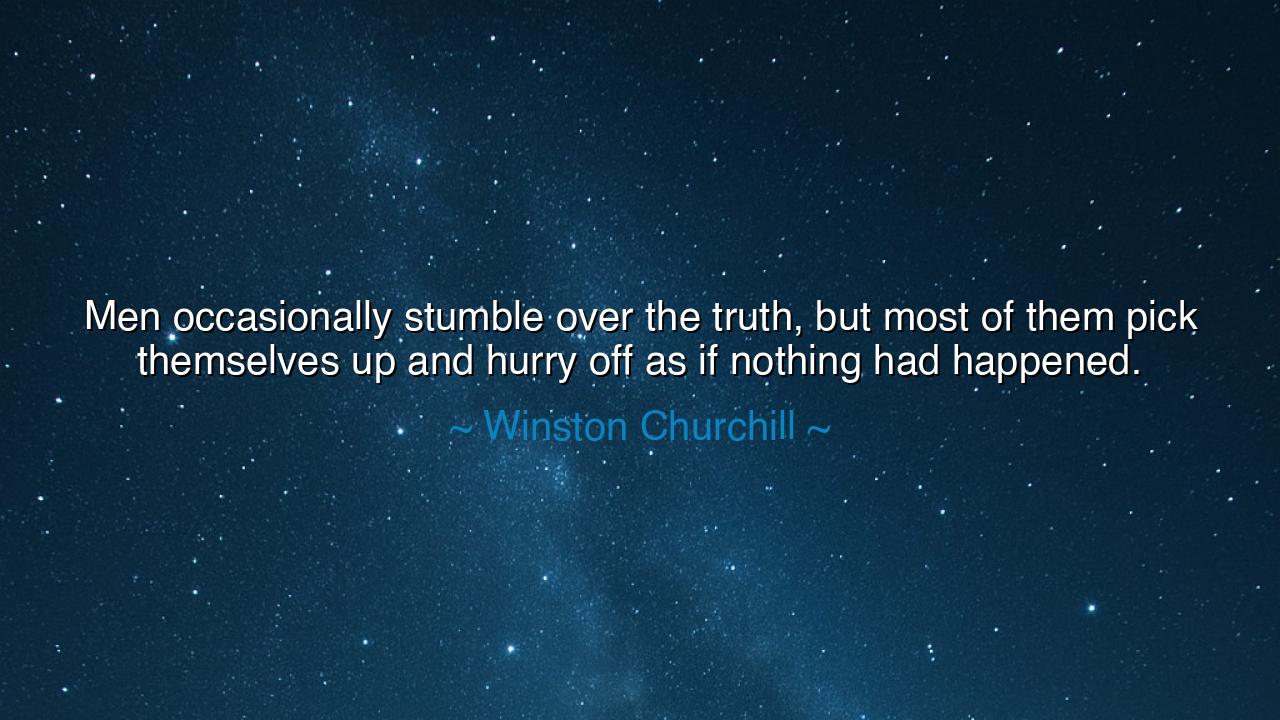
Men occasionally stumble over the truth, but most of them pick
Men occasionally stumble over the truth, but most of them pick themselves up and hurry off as if nothing had happened.






"Men occasionally stumble over the truth, but most of them pick themselves up and hurry off as if nothing had happened." — these words by Winston Churchill carry with them a timeless observation about the nature of human behavior and our relationship with truth. It is said that truth is often elusive, and when it is encountered, it is not always embraced or understood. Churchill, in his characteristic wisdom, notes the reluctance with which people face truth when it is inconvenient or uncomfortable. For many, encountering the truth is like stumbling on a rock in their path—painful, perhaps shocking, but easily ignored or avoided when it is too difficult to confront.
In the ancient world, philosophers like Socrates and Plato wrestled with the concept of truth as a guiding principle for life. Socrates famously declared, "The unexamined life is not worth living." He believed that the pursuit of truth was the most noble of human endeavors, and that those who sought wisdom would inevitably encounter profound truths—truths that would transform their understanding of themselves and the world. However, as the wisdom of the ancients teaches us, not all who sought the truth were prepared to face it. Some turned away from the harsh light of reality, choosing instead the comfort of ignorance. Socrates himself was sentenced to death for speaking truths that the society of his time could not bear to hear. In his case, the truth was something that many preferred to avoid, for it threatened the established order of their lives.
Churchill’s words evoke a similar theme. How often do we stumble upon the truth, whether in our personal lives, in politics, or in the grand affairs of the world, and yet turn away, unwilling to engage with what we have discovered? The truth often forces us to re-examine our beliefs, to challenge our assumptions, and to change the course of our lives. This is why many choose to hurry on, avoiding the discomfort that truth brings. It is not simply that truth is difficult to hear, but that it demands action—it requires us to act on what we know, and this is where many falter.
Consider the example of King George III of England. In the years leading up to the American Revolution, he was presented with the truth that the American colonies were growing increasingly discontented with British rule. Yet, instead of recognizing the gravity of the situation, King George and his advisors continued on their path, convinced of their own righteousness and unwilling to confront the shifting tides of history. By the time the full consequences of their actions became undeniable, the loss of the colonies had already begun. This is a striking example of a powerful man stumbling over the truth and then hurrying off, dismissing the signs until it was too late.
In more recent history, Adolf Hitler and the leaders of Nazi Germany also stumbled upon the truth of their own downfall. As the war turned against them, they could see the inevitable defeat on the horizon. However, the Nazis, led by Hitler, continued to stubbornly pursue a path of destruction, unwilling to accept the truth of their inevitable defeat. The consequences were catastrophic—not only for Germany but for the entire world. In this instance, the truth was clear, but those in power chose to ignore it, to stumble over it and continue their march toward ruin.
Churchill’s quote also serves as a reminder of our own tendencies to avoid confronting difficult truths in our personal lives. How often do we stumble upon the truth—perhaps about our relationships, our health, or our own flaws—and yet choose to ignore it because it is too painful or too challenging to confront? Perhaps we face the reality of a toxic relationship, a bad habit, or an unfulfilled dream, and instead of addressing the problem, we hurry off, pretending it does not exist. The lesson is clear: avoidance of the truth is not a solution, but a surrender to the status quo.
The lesson here is one of courage—the courage to confront the uncomfortable truths that we encounter, to embrace them, and to act on them. Truth is not something to be feared or avoided; it is the compass that guides us toward growth and progress. If we wish to live lives of integrity, we must face the truths that arise in our path, no matter how inconvenient or painful they may be. To stumble over the truth is inevitable, but to hurry off without learning from it is a choice. Let us choose to pause, to reflect, and to let the truth transform us, just as the great thinkers of old allowed truth to shape their lives and destinies.
In our own lives, we must strive to cultivate awareness, to listen to the truths that confront us, and to act with honesty and integrity. The next time we encounter a truth—whether personal or societal—let us not turn away. Let us face it with the bravery and resolve to understand it and to act in accordance with it. For only through this engagement with truth can we hope to create a world that is not driven by ignorance, but by wisdom and purpose.






AAdministratorAdministrator
Welcome, honored guests. Please leave a comment, we will respond soon